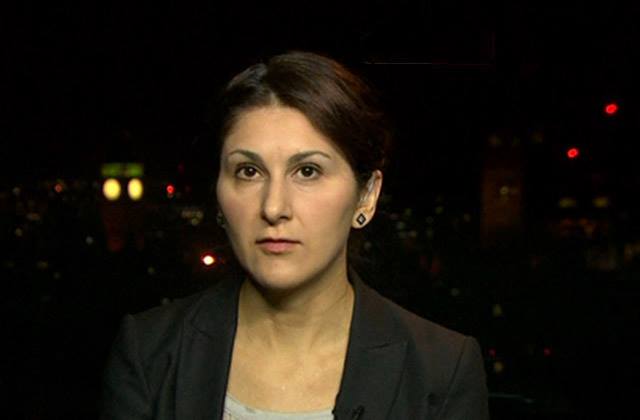They’ll Demand from the Armenian Side to Agree on a Settlement Package Based on Former Unfavorable Road Map

Interview with Lilit Gevorgyan, Russia and CIS, Europe senior analyst at IHS Global Insight.
Sargsyan-Aliyev meeting took place in Vienna, after which the Co-chairs, RA presidential office appeared with statements, providing minimal information on the subject of negotiations. However, it’s clear that subject of negotiations was the mechanisms, on some of which Azerbaijani authorities express uncertain dispositions and which have been somewhat clarified after Biden’s call to Azerbaijan, when Novruz Mammadov stated they are not against expansion of the existing Office of the Personal Representative of the OSCE Chairperson in Office. In your opinion, what occurred in Vienna? What will be its aftereffect?
It’s clear that OSCE MG succeeded to bring the sides to the negotiation table. This was success for the Minsk Group. It’s also clear that particularly the USA is consistent in establishment of security system, as observed from Biden’s call and Azerbaijan’s re-edited statement, by which Baku agreed on establishment of that system. However, Azerbaijan will really agree on that system provided that the Armenian side will agree on phase-to-phase implementation of Russian Kazan deal, pursuant which the Armenian side should withdraw the five regions under its control, and a referendum should be held in Nagorno-Karabakh, although its deadlines are still uncertain.
Azerbaijan is also consistent that a precise schedule was set for taking these regions. During the negotiations to be launched in June, probably, this will be the claim from the Armenian side. The problem of the Armenian side is that without public discussion it agreed on the settlement by unfavorable conditions for it. After the April war RA president Serzh Sargsyan seemingly attempted to pave the way to abdicate from them, however, he didn’t dare to do it openly. Both militarily and diplomatically Azerbaijan continues pursuing more confident and offensive strategy. By Russia’s support, Baku attempts to gain the maximum from close relations with Russia, weakness of Mink Group, as well as current dependency of the Armenian Government on Russia and readiness of Armenia’s authorities to go to a compromise, examples of which are agreeing on Madrid, then Kazan Principles.
Moreover, throughout 22 years Azerbaijan has created a rather rich army, which has the function of imposing diplomatic settlements on Armenia. The April war showed Azerbaijan that while it has Russia’s mysterious silence, it may attempt to change facts in Karabakh by force of the weapon and create new realities, which may be imposed on the Armenian side later on.
After the meeting information was released that Vladimir Putin, RF president, has convened a Security Council session to discuss NK conflict. What should be anticipated from Russia? What did this mean?
Of course, it’s difficult to say what has exactly been discussed. However, Karabakh issue should be observed in a wider context. Presently Russia is in comparatively better working relations with the West regarding Syrian issue. However, this cooperation, despite Russia’s hopes, in any case, doesn’t soothe tough disposition of the West in other issues. For instance, to all probabilities, the EU will extend sanctions against Russia. The decision is anticipated in late July. In the period of July 8-9 NATO Summit will be launched in Warsaw, during which Ukraine and Georgia, probably, will obtain the status of an “Associated partner.” Yet in May NATO organized military trainings in Georgia, which was strictly criticized by Moscow. For Russia it’s important to keep Azerbaijan under its zone of influence, as the latter may also follow Georgia’s example.
For this very reason Russia makes use of NK conflict. Complete settlement of Nagorno-Karabakh conflict is not in the interests of Russia. And Kazan document is very beneficial for Moscow for that very purpose. By that Azerbaijan will record serious territorial achievements for which it will be more integrated into Russia. Moreover, power of Aliyev and his family will become unshakeable in Azerbaijan. And NK will remain subject of the very conflict, as its final status won’t be resolved, which may be used by Russia as a tool against Azerbaijan, if the latter in the future, after obtaining the five regions, adopts a pro-West policy.
As it was observed from the April war the USA became active and appeared with initiatives: in this period Kerry has repeatedly communicated with Lavrov to discuss NK conflict and Syrian crisis, and later on—Biden. To your mind, will the USA maintain this level of its engagement and how productive will it be?
The USA and Russia almost always cooperated regarding NK issue. We shouldn’t forget that they weren’t against those very Kazan principles reasoned that in 2011 when they were being discussed, USA-Russia relations weren’t in current “cold war” condition. The USA intends to observe final and speedy settlement of NK conflict, as it’ll reduce dependence of the parties to the conflict from Russia. They also will anticipate withdrawal of some lands by the Armenian side, as a part of the settlement. However, it’s not clear which settlement variant they will prefer. Presently main concern of the USA is avoiding big war, as this may provide Russia the opportunity to more increase its influence. In case of big war the USA may gain little for the time being, in particular, when it’s not clear yet which will be Russian or Turkish reflection to that. Azerbaijan is an important state in the region for the USA, particularly to the sense that Azerbaijan is an alternative country regarding energy export.
Naturally, Azerbaijan can’t even be compared to Russia by its energy reserves, however, it may be a useful transit country to export energy from Central Asia to the West. Azerbaijan’s rapprochement with Russia will weaken Azerbaijan’s strategic importance for the West to some extent. To all probabilities, Russia and the USA, at least seemingly will coordinate their steps in negotiations. However, this doesn’t yet mean that the sides completely trust one another, and all agreements are respected. USA-Russia current relations will also influence the forthcoming Karabakh developments.
The Co-chairs and presidents in Vienna agreed to meet in June. What should be anticipated from this meeting?
To all probabilities they’ll demand from the Armenian side to agree on a settlement package, which will be grounded by former unfavorable road map for Armenia. Azerbaijan will likely demand clear deadlines, at least to get back five regions. Probably, Baku will put forward a condition that it’ll implement use of investigative mechanisms only in case the Armenian side will agree on the schedule of withdrawing territories. Serious tension should be anticipated on the border as well. Azerbaijan, encouraged by its success in the April war, will go on insisting, including by war, to restore its right to territorial integrity. If formerly such threats were being ignored, then after the April war even OSCE Co-chair Germany’s FM warns, that threat for great was is existent. This originates legal issue for Azerbaijan, as the Armenian side may dispute that it’s not able to sign any document under threat. According to the principles of international law agreements concluded under duress may be recognized invalid.
What should be anticipated from Azerbaijan’s actions in this period? There are opinions, that Azerbaijan’s economic problems won’t allow to launch wide-scale military operations. What should we be ready for? How grounded are these opinions?
Yes, Azerbaijan faces serious economic issues. It will have to restrain its state expenditures throughout the forthcoming several years. Sustained war isn’t preferable for Azerbaijan. However, I don’t consider that wide-scale war will last long. If Baku decides to attack, it’ll invest all its capabilities in recording touchable results in a short period. For Aliyev, despite expenditures, such victory will be a brilliant success to strengthen his power. And the exhausting war is not so beneficial economically. If developments like the April war are recorded, this will directly increase the possibility of uncontrollable big war. Military response of the Armenian side may also be unpredictable, especially, when opinion has been developed among the Armenian community that peace may only be exerted by new military victory of Azerbaijan.
Tactics of exhausting war will increase the risk of doing business in Azerbaijan, in particular, if it leads to destruction of economic substructures, for instance, roads, surface energy installations, railroads. Drop in price for oil again revealed Azerbaijan’s unhealthy dependency from oil market prices. Country’s non-energy sector needs investments and serious development, which Azerbaijani authorities and president of the Central Bank are actively touching upon. To bring in foreign investments Azerbaijan should have beneficial business conditions, as well as predictable geo-political and political risks.
In your opinion, at this stage which factors will Azerbaijan’s forthcoming steps and resolutions be conditioned by?
Azerbaijan’s further steps will be decided by external factors, in particular, by the policy led by Russia, as well as the USA and Germany in the region. I don’t mention Turkey as that country openly protects Azerbaijan and will support Baku in all issues, which will strengthen Azerbaijan, although I don’t think Turkey will be involved in the active war. Azerbaijani issue is mainly used by Turkey’s authorities for domestic policy purposes, as this issue particularly bothers national electorate. However, Armenia’s internal political developments, behind which both Moscow and Baku are found, are strictly crucial. The April war has definitely weakened the power of the incumbent president, as well the oligarchic governance system in the country. Seemingly a rather serious political movement isn’t observed, but the possibility of drastic changes has increased. To some extent, this makes steps by the Armenian side unpredictable in case of a new escalation.
What may these new public moods and demanding lead to?
Armenian public opinion is gradually coming to the conclusion, that present-day governing system is not simply adequate to settle country’s issues, it’s not able to defend country’s physical security. Authorities should draw conclusion very rapidly and implement very serious systemic changes in the political system, as well as in the fields of economy and diplomacy. Armenia will be in military situation for long years. This is not an exclusive thing, but a reality for many countries of the world, facing security issues with neighboring countries, internal militants or terrorists.
Having a state pursuing national interests on military and diplomatic level is only a matter of time and the April war and Russia’s reflection have only accelerated the process of creation of this new system. When the society assumes liabilities like financing of the army, organization of treatment of soldiers, families of fallen soldiers, the wounded, implementation of military service on border, speedy reflection of foreign policy unfavorable developments, then it’s only a matter of time, when the same society will create a system, which will be forced to implement state functions.
By Araks Martirosyan

























